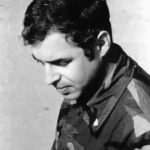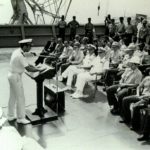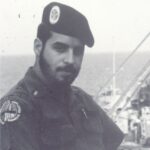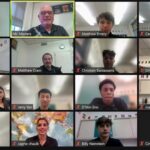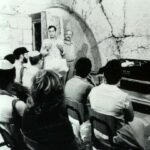Arnold Resnicoff was born October 10, 1946 in Washington, D.C. He grew up there in the context of the 1950s and 60s, witness to the tremendous forces of change that were shaping the world. He lived in the new suburban neighborhoods of the time, watching the miracle of television – on three channels. He also saw the dramatic escalation of the Cold War, and as the 60s dawned he saw the civil rights and women’s movements and the overall emergence of a culture of protest, which was geared toward addressing the fundamental inequities that were at the heart of America. He also became aware of the antisemitism that was prevalent and open in those days. A student at Dartmouth, Arnold took a year off to work at a kibbutz in the newly established nation of Israel, and on his return he felt compelled to follow his American patriotism, which would take him to Vietnam. His service took place in the “brown water navy” in the Mekong Delta, where he worked to stop Vietcong intrusions. A navy chaplain at that time asked for Arnold’s help in planning and delivering Jewish services; that chaplain was an Episcopal priest, tasked with being a circuit riding chaplain for Vietnam’s Mekong Delta. When his time in the navy was done, Arnold opted to attend rabbinical school. He went on to be a serving rabbi in the American military, acting as a chaplain and serving the needs of military members of all faiths. In 1982 those duties took him to the eastern Mediterranean, when navy ships were in that area attempting to protect a fragile peace in Lebanon. When a Jewish Marine was killed by a sniper Rabbi Resnicoff was brought in for his service. That Marine was the fifth American killed during American participation with the Multinational Peacekeeping Force there. Because he doesn’t travel on Shabbat — the Jewish sabbath – he did not leave on Saturday, October 22, but instead waited until Sunday, October 23, which turned out to be the day of the bombing. Rabbi Resnicoff was in the building 75 yards from the building that was demolished by the explosion. 241 U.S. military personnel, including 220 Marines, 18 sailors, and three soldiers were killed in that attack. Minutes later, a second suicide bomber killed 58 French paratroopers. Six innocent Lebanese civilians also lost their lives. Rabbi Resnicoff and his fellow Catholic chaplain emerged as beacons of light and faith in the wake of that terrible event, and through their actions and words Americans – and others around the world – looked at those events through a new lens. For Rabbi Resnicoff the ability to see difficult events with an interfaith focus in mind became a necessity, and it guided his beliefs and actions as a military chaplain. In this interview, Rabbi Resnicoff shared elements of his personal story, and he also commented at length on elements of Jewish culture and belief, as well as issues pertaining to present-day antisemitism. He was interviewed over zoom by Crestwood students in May 2024.
Videos
Click next video below to keep watching
